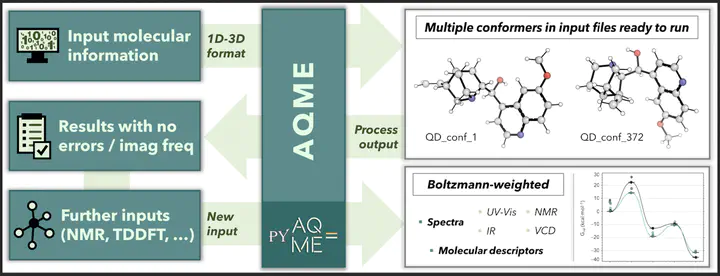
Abstract
AQME, Automated Quantum Mechanical Environments, is a free and open-source Python package for the rapid deployment of automated workflows using cheminformatics and quantum chemistry. AQME workflows integrate tasks performed across multiple computational chemistry packages and data formats, preserving all computational protocols, data, and metadata for machine and human users to access and reuse. AQME has a modular structure of independent modules that can be implemented in any sequence, allowing the users to use only the desired parts of the program. The code is intended for researchers with basic familiarity with the Python programming language. The CSEARCH module interfaces to molecular mechanics and semi-empirical QM (SQM) conformer generation tools (e.g., RDKit and Conformer–Rotamer Ensemble Sampling Tool, CREST) starting from various initial structure formats. The CMIN module enables geometry refinement with SQM and neural network potentials, such ANI-1. The QPREP module interfaces with multiple QM programs, such as Gaussian, ORCA, and PySCF. The QCORR module processes QM results, storing structural, energetic, and property data while also enabling automated error handling (i.e., convergence errors, wrong number of imaginary frequencies, isomerization, etc.) and job resubmission. The QDESCP module provides easy access to QM ensemble-averaged molecular descriptors and computed properties, such as NMR spectra. Overall, AQME provides automated, transparent, and reproducible workflows to produce, analyze and archive computational chemistry results. SMILES inputs can be used, and many aspects of tedious human manipulation can be avoided. Installation and execution on Windows, macOS, and Linux platforms has been tested, and the code has been developed to support access through Jupyter Notebooks, the command line, and job submission (e.g., Slurm) scripts. Examples of pre-configured workflows are available in various formats, and hands-on video tutorials illustrate their use.